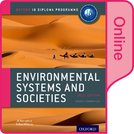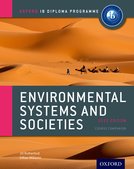IB Environmental Systems and Societies- engaging learners

Teachers often mention that it's challenging to engage and motivate learners who are less scientifically minded.
Jill Rutherford from Ibicus International provides here some thought-provoking activities that incite students' curiosity and get them thinking critically about the practical applications of the learning material.
Activity 1: Environmental attitudes questionnaire
This activity is related to Topic 1.1 on the spectrum of environmental value systems (EVS) from anthropocentric to technocentric. It asks students to think about the following statements about the environment and decide whether they agree strongly, agree, don’t know, disagree or disagree strongly with each.
Encourage them to discuss their responses with their classmates. Do they have different viewpoints? Why do they think this is?
- Humans are part of nature.
- Humans are to blame for all the world's environmental problems.
- We depend on the environment for our resources (food, water, fuel).
- Nomadic and indigenous peoples live in balance with their environment.
- Traditional farming methods do not damage the environment.
- Nature will make good any damage that humans do to the Earth.
- Humans have every right to use all resources on the planet Earth.
- Technology will solve our energy crisis.
- We have passed the tipping point on climate change and the Earth is warming up and we cannot stop it.
- Animals and plants have as much right to live on Earth and humans.
- Looking at a beautiful view is not as important as economic progress.
- Species have always become extinct on Earth and so it does not matter that humans are causing extinctions.
Activity 2: Why conserve biodiversity?
This activity relates to Topic 3.4 on conversing biodiversity. It asks students to consider and analyze their responses to conserving biodiversity. It can be used as a starting point for discussion as there are many factors to be considered such as the student’s own environmental value system. Ask them to think about whether their reasoning is based on emotional or rational thought and whether this affects how valid their responses are.
- Do humans need other species? In what ways
- Do other species exist for human use? Do they only exist for human use?
- Do other species have a right to exist? Does a great ape have more rights than a mosquito?
Jill Rutherford is Academic Director for Ibicus International, one of the leading IB teacher training organizations in the IBAEM region.
More support from Jill Rutherford
IB Environmental Systems and Societies Course Book
Actively connect learning with wider global themes that engage teenagers. The accessible, inquiry-based approach drives critical thinking, truly motivating learners and supporting strong results.
Search results
|
Product 
|
IB Environmental Systems and Societies Online Course Book: Oxford IB Diploma ProgrammeThe only DP resources developed with the IB Author Jill Rutherford and Author Gillian Williams 978-0-19-833258-9 Digital Licence Key | 12/03/2015 Price: £50.99 +VAT |
|
Product 
|
Oxford IB Diploma Programme: Environmental Systems and Societies Course CompanionThe only DP resources developed with the IB Author Jill Rutherford and Author Gillian Williams 978-0-19-833256-5 Paperback | 26/02/2015 Price: £50.99 Also available as an ebook |
© 2024 Oxford University Press. All rights reserved.




